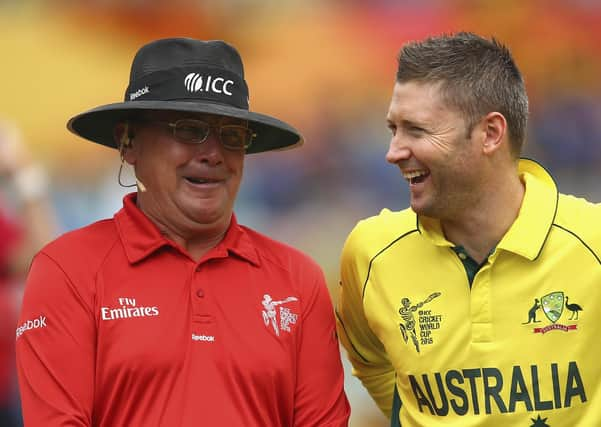Christmas books - Hit for six by the best of the Christmas cricket stories


The former England, Middlesex and Sussex wicketkeeper, who earned his nickname during a stint at Arsenal, found greater fame when he swapped his cricketing whites for an umpire’s coat, which he has worn for the best part of 20 years –13 of them on the international circuit.
A popular figure on-and-off the field, with a ready smile and a natural way with players, Gould, 63, finally hung up his white coat as an international umpire at Headingley last year with the World Cup match between India and Sri Lanka.
Advertisement
Hide AdAdvertisement
Hide AdIt was the last of 140 one-day internationals in which he stood, to go with 74 Tests and 37 T20 internationals, although he continues to officiate in county cricket, having also played 18 one-day internationals as a player, including during the 1983 World Cup in England.
How fitting, then, that Gould should have chosen another World Cup in England for his international swansong – not that he ever really wanted to step down.
As he writes in Gunner: My Life in Cricket (Pitch Publishing, £19.99), and superbly ghosted by cricket writer Peter Jacob, he rather pre-empted the expected decision of the International Cricket Council.
“It was back in 2014 when ICC first mooted to us that the retirement age for an umpire on the elite panel would be 62,” says Gould, adding that “the problem I had with this was nothing was said, or communicated officially in writing or email, by ICC to inform you that you stopped at 62.”
Advertisement
Hide AdAdvertisement
Hide AdSo Gould took matters into his own hands, announcing that the 2019 World Cup would be his international farewell, with that India-Sri Lanka match in Leeds coming 44 days before his 62nd birthday.
“I wish the game itself had been a bit more exciting, but India strolled to victory, winning by seven wickets with 39 balls to spare,” he writes. “It was all over by 6pm. As I was walking off, both sets of players shook my hand and Virat Kohli gave me a hug and said some very nice things, which meant a lot.”
Gould goes on: “The irony of my departure… is that it came when I felt I was umpiring better than at any time in my career. I’d go as far to say that over the three years before I retired from the international circuit, I had actually improved my level of skill.”
After that fixture at Headingley, surrounded by his loving family and many beloved colleagues, the tears flowed.
Advertisement
Hide AdAdvertisement
Hide Ad“Sitting in the umpires’ room afterwards, with a few of my former colleagues, reminiscing about the past was the only time that I felt emotional,” he said. “It was one of the rare occasions when I shed a few tears.”
Gould had asked not to stand in the World Cup final or in either semi-final as he did not want a big-send off and for it to turn into what he termed the ‘Gunner Gould Says Goodbye’ show, an attitude that sums him up well.
He was also thinking of his fellow professionals, those umpires who desperately wanted to stand in those games, insisting: “My imminent departure was not a justification for giving me a big game to finish with.”
In his book, Gould goes into the notorious sandpaper Test at Cape Town between South Africa and Australia in 2018, when he was third umpire, and when the tourists infamously tampered with the ball.
Advertisement
Hide AdAdvertisement
Hide AdHe gives the inside track on many of the game’s great moments and candidly chronicles his mental health struggles. Above all, though, this is a book of gratitude and of good humour.
As Gould concludes: “It’s been a privilege and I wouldn’t have changed any of it.”
Another two books this year from the Pitch stable have found their way to YP Towers.
‘The Unforgiven: Mercenaries or Missionaries?’ (Ashley Gray, priced £19.99) turns the spotlight on the rebel West Indian cricketers who toured apartheid South Africa in the early 1980s.
Advertisement
Hide AdAdvertisement
Hide AdAccused of pocketing “blood money”, they were widely condemned and in many cases shunned by their fellow countrymen.
It is a terrific book – moving, revelatory, and a fascinating glimpse into the human condition.
Ditto ‘Barbed Wire And Cucumber Sandwiches: The Controversial South Africa Cricket Tour of 1970’ (Colin Shindler, £19.99).
Amid growing global disgust at apartheid, the battle to stop and then save the tour divided opinion.
Advertisement
Hide AdAdvertisement
Hide AdThis book brilliantly shines a light on one of the game’s greatest controversies.
Closer to home, no praise is high enough for the eminent Yorkshire cricket writer David Warner and ‘Just A Few Lines: The Unseen Letters and Memorabilia of Brian Close’ (Great Northern Books, £20).
Expertly edited by Ron Deaton, the author has magnificently marshalled previously unseen archive material, including scores of letters written by the late Yorkshire and England legend early in his career to a lifelong friend.
Another outstanding offering is ‘I Was There’ (Caboodle Books, £7.99) by JR Snook.
Advertisement
Hide AdAdvertisement
Hide AdSnook, of Ben Rhydding, skilfully details the 15 biggest sporting events that he has attended live, including Headingley ’81 and the tragedy of the Bradford City fire.
Support The Yorkshire Post and become a subscriber today. Your subscription will help us to continue to bring quality news to the people of Yorkshire. In return, you’ll see fewer ads on site, get free access to our app and receive exclusive members-only offers. Click HERE to subscribe.
Comment Guidelines
National World encourages reader discussion on our stories. User feedback, insights and back-and-forth exchanges add a rich layer of context to reporting. Please review our Community Guidelines before commenting.